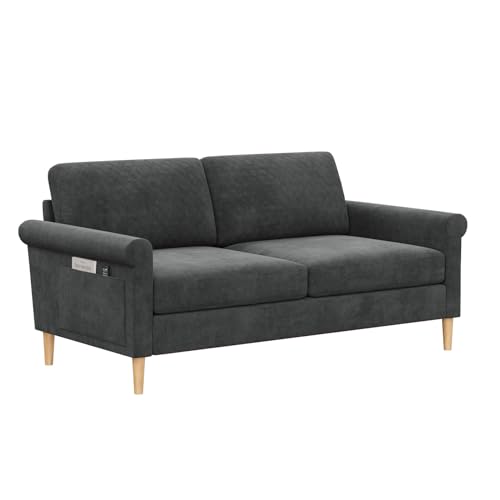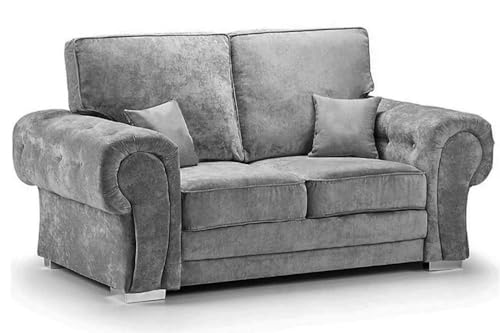Guide To 2 Seater Leather And Fabric Sofa: The Intermediate Guide For …
페이지 정보

본문
 Choosing Between a 2 Seater Leather and Fabric Sofa
Choosing Between a 2 Seater Leather and Fabric Sofa If you're looking for a new sofa it can be tricky to choose between fabric or leather. This is especially the case if you're not a professional with experience with furniture.
If you're looking for a new sofa it can be tricky to choose between fabric or leather. This is especially the case if you're not a professional with experience with furniture.If you have children or live in a smaller space, a leather option could be best for you. It is easy to clean and looks great in most homes.
Comfort
A sofa is the focal feature of many people's living areas and is a major purchase. You want a sofa that can be sat on for many hours, that looks great and stands the test of time. The decision between fabric or leather isn't easy, but it is important to evaluate your needs as well as your lifestyle and budget prior to making a choice.
Leather is a premium, luxurious material that radiates style and elegance in any home. It is durable and stain-resistant. It is also resistant to pets and children, and will last for a long time if properly cared for. However, it can be more expensive initially and will require regular conditioning to prevent cracking or peeling.
Fabric sofas are available in a huge variety of styles, colors and fabrics and can be an affordable alternative to leather sofas. They are also softer and more cosy with the capacity to feel "broken in" from the start. They are susceptible to dust mites and pet hairs, and may require frequent cleaning. However, thanks to advances in technologies and performance fabrics, there are now hypoallergenic alternatives available.
Fabric sofas can last up to 15 years if they're maintained properly. Regular vacuuming and deep cleaning will ensure that the fabric stays clean and free of stains and odours. They also tend to flatten and sag in time, much like leather. A lot of 2 seat fabric sofa couches are treated with chemicals that make them stain-resistant and flame retardant. These couches can release volatile organic chemicals that could cause allergic reactions and impact the quality of air in the indoors.
Durability
We usually choose sofas made of fabrics that are very robust, particularly if we have children or pets. You don't have to spend a lot of money up front in case you'll regret it after the very first smudge or claw. In the same way you don't want to purchase a product that isn't expensive but doesn't stand up to regular use.
Leather, on the other hand is extremely tough and has incredible tear strength. It can last up four times longer than fabric and is resistant against cracking, fading and flaking. It can also be treated to restore its natural oils, and look as fresh as new.
Fabrics are a less expensive alternative and are available in a variety of colors patterns, textures, and patterns to suit any interior design scheme. They are also cleaner than leather and can withstand a decent amount of wear and tear, however they tend to be more prone to moisture and can be susceptible to fading as time passes.
Microfiber is extremely durable and comes in a variety of colors. However, it might not be as sturdy as genuine leather. It might also not be able to take scratches. But, it's an excellent choice for families due to of its resistance to spills and stains and is easy to clean, typically with a damp cloth.
Suede is more difficult to clean and repair than leather. It's shape can change and feel rough if it is not maintained regularly. It is also a thin material and therefore may not be as tough as sheepskin or cowhide.
Allergens
The material the sofa is constructed of can have a major impact on your allergies, which is why it's important to understand the various options that are available. Fabrics tend to store allergens like dust mites, pet dander, and mold that can trigger symptoms of allergies like rhinitis, hay fever, asthma and eczema. These fabrics are perfect for them to thrive.
Leather, on the other hand, is not prone to the accumulation of allergens and can offer consistent comfort throughout the year. It can also trigger allergic dermatitis in those with contact dermatitis, or are sensitive to the chemicals used in tanning. Using vegetable-tanned leather and maintaining a vigilant skincare regimen are essential for mitigating skin reactions.
Both leather and fabric sofas are robust, but the fabric you choose will have a major impact on how well your sofa can stand up to wear. A high-quality fabric will hold up to daily use without fading or sagging and can withstand spills and body oils easily. Modern fabric couches are often equipped with stain-resistant treatment to make cleaning easy.
You may not be able to completely avoid an allergic reaction to the leather on your sofa but you can to reduce allergens by keeping a lint-roller nearby and clean regularly your living space. This will help in reducing the amount of dirt, pet hair and dust mites that build up on your sofa. If you are still suffering from allergies, replace your sofa with a hypoallergenic one. For example, a sofa made of synthetic leather or vinyl will be less likely to hold dust and pet mites. It can also allow you to breathe easier.
Scratches
It is crucial to think about how much wear you can expect a leather couch to endure. The finish, color and the quality of the leather are all crucial aspects in how long a couch will last. You also want to ensure that it is sturdy enough to stand up to spills and other accidents. You can accomplish this by choosing a couch with a strong hardwood frame and high-density foam cushions.
Leather can be scratched for a number of reasons, including stretching, marking territory or recovering the stress. Scratches vary in severity. They vary from minor surface scratches, to severe punctures or cuts. small 2 seater fabric sofa scratches can be fixed by applying a conditioner for leather to the area affected. This will restore the equilibrium between moisture and oil in the leather and stop it from drying out or cracking. The amount of damage will determine the type of treatment needed.
If you have cats, it's recommended to trim their nails on a regular basis, as this will aid in preventing them from scratching your sofa. You can also stop your cat's scratching habits by giving them alternative scratching surfaces such as sisal rope or cardboard. Another option is to use a pet-safe furniture polish that can be applied with soft cloths to the damaged area.
It is important to wash your leather couch regularly and keep it away from direct sunlight and heat because they dry it out. This can cause cracks in the leather. Repairing this is usually difficult and requires the reupholstery. Use a leather conditioner in order to keep the leather soft.
Smell
Leather couches tend to smell a little different than fabric. It's because it's more porous and will absorb unpleasant odors like smoke, body odor, or food quite easily. The good news is that odors usually dissipate over time, especially when you use a non-toxic, fragrance free cleaner.
However, if the odor is very overpowering it could mean there's something wrong with the foam. This is typically caused by the chemical off-gassing process of polyurethane, which is a petroleum-based derivative. If this is a concern, look for couches made from CertiPUR US certified latex or natural latex.
Another method to determine faux leather is to feel for bumps or texture on the back of the sofa. This indicates that the leather is bonded and not genuine top grain. You can also do an inspection by tilting the sofa 2 seater fabric to one side and observing any visible upholstery backing. If you can smell it, it's probably a synthetic substance, such as polyester or polyurethane. These types of materials are likely to have a different smell than leather.
Cleaning your leather sofa regularly can help keep it in good condition and smell great. This will keep it looking great and smells great and also prevent it from becoming stiff or cracked over time. Begin by vacuuming and dusting the couch with baking soda (a natural method to get rid of odors). You should do this at least once every two weeks or more in order to get rid of any dirt and dust accumulation. Apply leather conditioner to keep the color and texture of your sofa.
- 이전글10 Things Everybody Has To Say About Accident Injury Attorney Accident Injury Attorney 24.11.04
- 다음글15 Gifts For The Solid Wood Cot Bed Uk Lover In Your Life 24.11.04
댓글목록
등록된 댓글이 없습니다.
